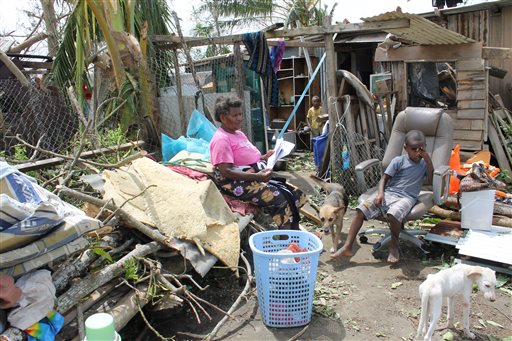Half of Vanuatu’s population affected by Cyclone Pam—UN

In this Tuesday, March 17, 2014, photo provided by UNICEF Pacific, a Family in the Nikinini community sits surrounded by their belongings in the aftermath of Cyclone Pam. When Cyclone Pam ripped across the tiny South Pacific island nation of Vanuatu, there were fears its monstrous winds could kill thousands. But as aid workers finally reached the archipelago’s hard-hit outer islands on Wednesday, it appeared that residents’ familiarity with disasters and careful planning had spared the lives of most. (AP Photo/UNICEF Pacific)
PORT VILA, Vanuatu–More than half of the South Pacific island nation Vanuatu’s population has been affected by Cyclone Pam, the UN said Saturday as the death toll rose to 16.
Severe Tropical Cyclone Pam barreled into the archipelago a week ago, bringing sustained winds of some 250 kilometers (155 miles) per hour which devastated entire communities.
“Around 166,000 people, more than half of Vanuatu’s population, have been affected by Tropical Cyclone Pam on 22 islands,” the Office for the Coordination of Humanitarian Affairs (OCHA) said in a situation report.
“Food stocks and water reserves are being exhausted and will not last more than a couple of weeks across the affected islands.”
The agency said the confirmed death toll had risen to 16, as aid workers were able to reach new areas, with completed assessments covering 15 islands.
Article continues after this advertisementAid agencies have stressed that potable water, food, shelter and health were a priority in the aftermath of the storm which hit late on March 13.
Article continues after this advertisementThe latest assessment found damage to food crops was extensive.
“Coconut and banana plantations have been particularly devastated, which will have significant longer-term impact,” OCHA said, noting that most people living on the outer islands grow their own food.
In some areas local residents would not only lose their main source of income due to damage to crops such as copra, but their food security would be threatened by the loss of livestock, such as pigs and poultry, it said.
In its situation report, OCHA said that access to some communities was still hindered across the sprawling nation which is made up of more than 80 islands.
But it said between 50 and 90 percent of local dwellings were estimated to have been damaged by the fierce winds which pounded Vanuatu as the eye of the storm hovered over the nation for hours.
“Around 65,000 people are in need of temporary emergency shelter,” it added.
Aid agencies have mobilized to help the country, and are on the ground distributing food, water and health services but access to drinkable water is a concern after ground water sources were contaminated by the storm.
Schools have been postponed for two weeks, and are due to restart on March 30, with OCHA estimating that 500 schools were damaged, something which will affect up to 70,000 children.
The agency said fuel stocks were running low across the affected islands while electricity was mostly unavailable and generators are essential.
RELATED STORIES
Vanuatu conditions ‘more difficult’ than ‘Yolanda’